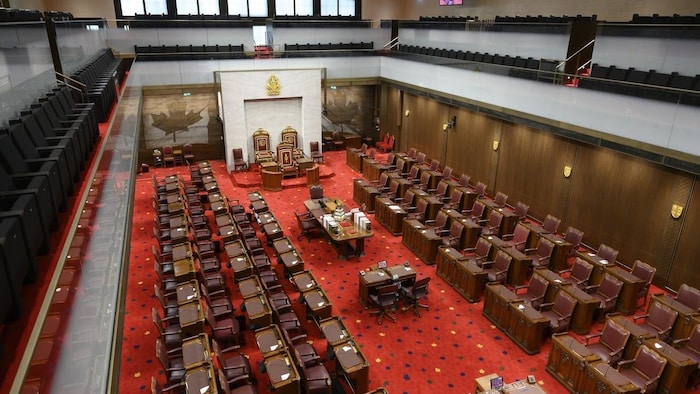The National Assembly of the First Nations Assembly (APN), Cindy Woodhouse Nepinak, calls on senators to slow down the Ottawa race for the adoption this week of the controversial bill on the major projects of Prime Minister Mark Carney.
Bill C-5 is presented at first reading in the High House on Wednesday. It has already been adopted in the accelerated procedure in the House of Commons, in addition to having been the subject of an exceptional prior examination by the Senate.
A programming motion adopted by the upper chamber fixes a strict schedule for the journey of the bill. The final vote must take place before the end of Friday.
This bill, with a strong political connotation, angered the anger of indigenous and environmental groups, which denounce the will of the federal government to be granted new powers in order to accelerate the granting of permits for these projects.
Carney argued that Canada is faced with the spectrum of an economic crisis caused by the trade war with the United States. According to him, the country has an urgent need to approve new projects which are deemed of national interest.
The National APN chef said on Wednesday that she hoped that the Senate Make the right decision this week
And grant more time to study the bill and propose amendments. An appeal that remained largely unanswered when it presented it to the deputies.
The bill received broad support for the House of Commons, where the conservatives voted with the Liberals to adopt it third reading at 306 votes against 31 last week. A liberal deputy voted against.

The controversial text could be adopted this week by the upper room. (Archives photo)
Photo : The Canadian Press / Sean Kilpatrick
Senator Paul Prosper said on Tuesday evening during an interview, that the bill progressed too quickly in Parliament and that he should better take into account the concerns raised by the indigenous groups which fear that the approval of the projects will affect their rights.
He undertook to try to amend the bill, but was not ready to specify how.
The general objective of the bill, I am sure that many people approve of it and see the need, said Mr. Prosper. But is it necessary to respect this period prescribed and shortened, when we do not follow the usual democratic process, to consider such a measure?
Certain general provisions authorize the government to suspend existing laws and legislative texts, which constitutes an extraordinary power in this regard. It may therefore be necessary to establish certain parameters on this subject, in order to ensure that certain considerations relating to the environment and which are an integral part of the taking into account of indigenous questions are respected.
Mme Woodhouse Nepinak has noted that the concept of prior consent, given freely and knowingly
– A condition for the United Nations Declaration on the Rights of Aboriginal Peoples, approved by Canada – is not mentioned in the bill itself, despite the commitment of Mr. Carney and his ministers to consult the indigenous peoples.
She also said she was concerned about the Aboriginal Advisory Committee that the Government wishes to integrate into the project approval process. She added that the government cannot use this organization to claim to have consulted the First Nations, because this consultation would not take into account the various positions of the country’s leaders.
An advisory committee appointed by the government will not be liable before the First Nations and will have no real power to guarantee their participation in the project
she said.

